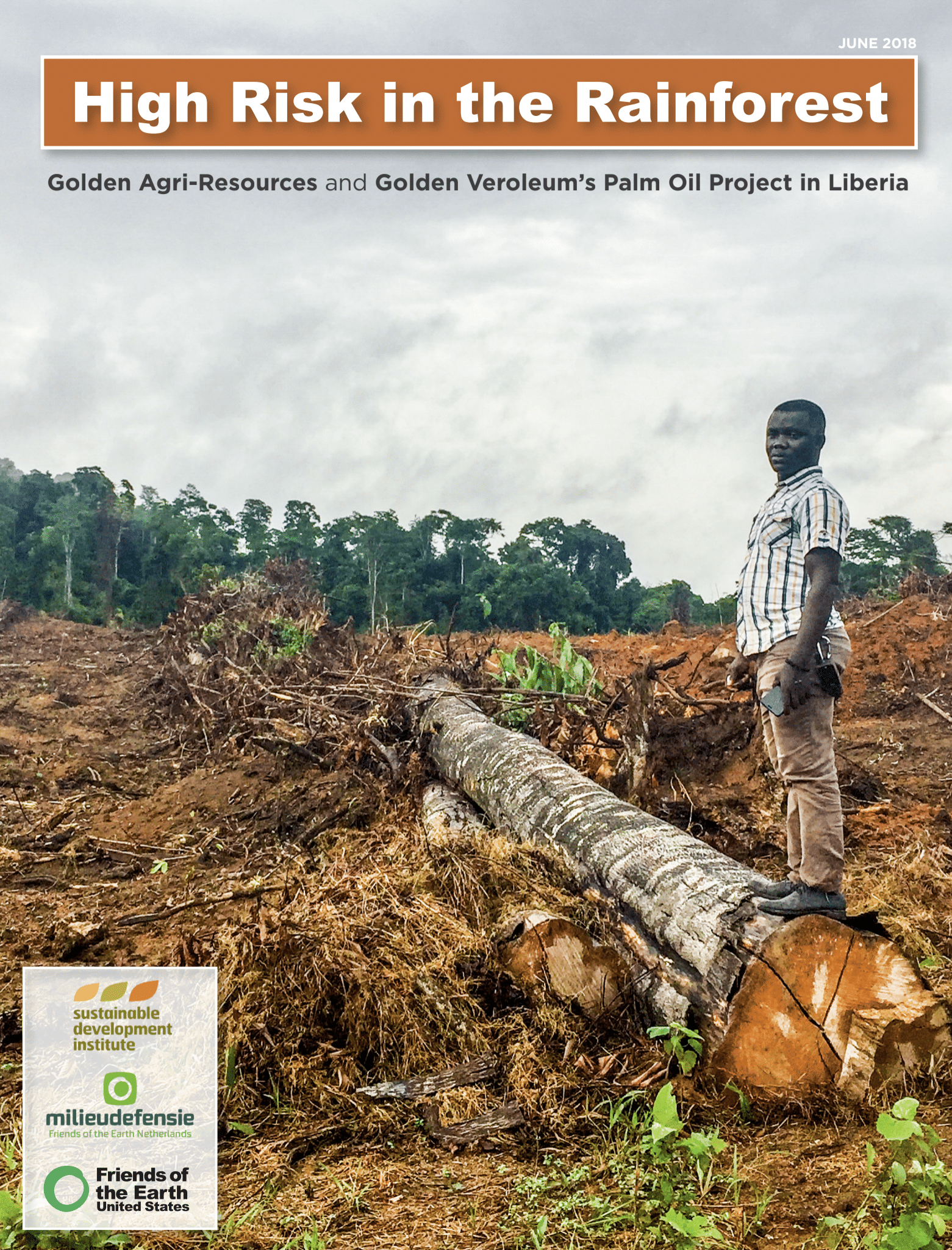High Risk in the Rainforest

Golden Agri-Resources And Golden Veroleum Liberia’s Palm Oil Project In Liberia
Read our press release.
Read community testimonies.
Learn the extent of deforestation and human rights violations.
Media Coverage
- Mongabay, Certified Weaknesses: The RSPO’s Liberian Fiasco. April 13, 2018
- Medium, Photo Essay: The Promise of Palm Oil Sows Anger and Doubt, May 2, 2018
- Medium, BlackRock’s Climate Problem, May 23, 2018
- Medium, Palm Oil on the Precipice, June 18, 2018
- Front Page Africa, Another SDI Report Finds GVL in Sinoe Land Grab, Deforestation, July 3, 2018
- Daily Observer, SDI Report Implicates GVL of Human Rights and Policy Violations, July 4, 2018
- Daily Observer, Stop the GVL Illegal Destruction of Liberia’s Forest Habitat, July 5, 2018
- Mongabay, New report spotlights financiers of palm oil giant clearing Liberia’s forests, July 17, 2018
Executive Summary
In August 2010, Golden Veroleum Liberia (GVL) signed an agricultural concession agreement with the Government of Liberia covering 350,000 hectares, or approximately 2.3 percent of the country’s land mass. The land indicated in the concession agreement is densely forested, rich in biodiversity and customarily owned and used by rural communities as the source of their food and water, livelihoods and culture. Since GVL’s arrival in Liberia, the company has faced consistent and well-documented allegations of human rights violations, environmental degradation and disregard for communities’ land rights. New findings indicate that GVL has failed to reform its operations, despite numerous complaints led with the Roundtable on Sustainable Palm Oil (RSPO) since 2012, including a comprehensive set of complaints armed by the RSPO Complaints Panel in February 2018.
GVL’s primary investor is Singapore-listed palm oil company Golden Agri-Resources (GAR)—one of the world’s largest palm oil companies. GAR established GVL through a series of investment vehicles in order to expand its palm oil plantations from Indonesia into West Africa while shielding itself from liability for the risks of the endeavor. As GVL’s primary investor, GAR bears substantial responsibility for the risks and impacts of GVL’s operations.
GVL’s ownership structure may prevent GAR from being held legally liable for GVL’s activities in Liberia. However, GAR’s sustainability policies clearly indicate its responsibility for GVL’s business practices. GAR identifies the scope of its social and environmental policy to extend to “all upstream and downstream palm oil operations that we own, manage or invest in, regardless of the stake,” thus clearly including GVL’s operations. GVL notes on its website that, “As an indirect investee company of Golden Agri-Resources, (GAR), we adhere to GAR’s Forest Conservation Policy (FCP), which applies to all farms GAR invests in regardless of stake.” Financiers of GAR are therefore linked to GVL’s environmental and human rights violations and land conflicts, and may face material financial and reputational risks as a result.
This work is licensed under a Creative Commons Attribution 4.0 International License.
Ways to Support Our Work

Read Latest News
Stay informed and inspired. Read our latest press releases to see how we’re making a difference for the planet.

See Our Impact
See the real wins your support made possible. Read about the campaign wins we’ve fought for and won together.

Donate Today
Help power change. It takes support from environmental champions like you to build a more healthy and just world.
